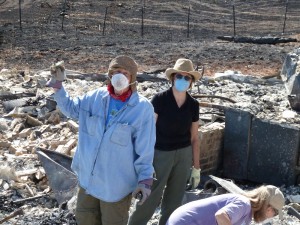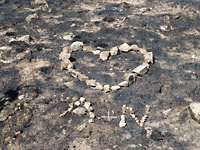 What’s the best way to help people after a disaster? Here are some FAQs and tips for helping folks who have just experienced great loss, from someone who’s walked a mile or two in their shoes.
What’s the best way to help people after a disaster? Here are some FAQs and tips for helping folks who have just experienced great loss, from someone who’s walked a mile or two in their shoes.
How can I help? Should I ask them what they need?
After you’ve experienced a major loss you have what I call “Disaster Brain.” You can focus like a laser on certain things, and other things are a complete muddle. It’s great when people offer to help, but it’s also exhausting to answer the question, “What do you need?” over and over. It’s much better to go ahead and offer specific help, as in, “How about if I bring you lunch? How about if I come over and sort out damaged stuff with you for an hour? How about if I drop by later and walk your dog?”
Don’t be offended if they say “No,” as they might be overwhelmed with people offering to help right now. Remember that they’ll need your help later, as recovery is a long haul. Wait a week and ask again, and remember, offer specific help like running errands, making calls, or babysitting.
Should I give people things or should I donate to a relief organization?
Giving to a relief organization is great, and it’s also good to give directly to survivors if you can. Be careful not to overwhelm people with a lot of stuff too soon, no matter how needed or well-intentioned. Right after a loss there are a million details to deal with and where to put stuff is not something you want to have to think about. If you have things to give them like clothing and furniture, you may want to keep it on hand for them for later after they’ve gotten things a bit more sorted out. For right now, do give them the following;
1) Gift Cards for stores like Target, Whole Foods, Safeway, Home Depot, Bed Bath and Beyond, and local retailers. Gift cards for grocery stores with delis are a treasure. Being able to pop in and get a sandwich is a lifesaver. Most people are in no shape to go out to dinner right now, so think before you purchase a restaurant gift card.
2) Food – There’s a reason why people bring casseroles in times of trouble – they’re easy to eat, store and reheat. Same goes for soup and bread. Keep it simple and don’t worry about making something elaborate. It’s really hard to eat when you’re traumatized, so keep that in mind. After my house burned down my friend Ann marched in and stuffed my little rental freezer full of organic macaroni and cheese and chicken pot pies. I could have kissed her.
3) Small Items of Comfort – Several people gave me small blankets and warm fuzzy socks after the fire, and I still take comfort in them. But again, don’t overwhelm people with stuff. When in doubt, give a gift card.
If you do drop things off, don’t expect the recipient to socialize or even hold a coherent conversation. Just give them a hug, give them the stuff, and leave. If you sense they are in need of company, comfort and/or support, then ask if it would be helpful to stay or if they need alone time. But don’t try to engage them in a long conversation or start talking at length about your experience of the disaster, or how upset you are about their loss. Just drop off the food or gift cards and skedaddle. Sometimes the greatest gift you can give them is some space.
Should I stay in touch with emails and calls, or should I just leave them alone until things settle down?
Staying in touch is good, but don’t expect answers to your calls or messages. Once you know they are safe and sound, simply let them know you’re thinking of them, offer help, and then send a lovely card of condolence. A hand-written card can do wonders to cheer you up on a bad day after a tragedy. And finding a gift card inside (labeled with the giver’s name and the amount) is a great bonus. Again, follow up in a week or so to see how they’re doing, but don’t overwhelm them with calls or messages.
How else can I help?
Pass along relevant and useful information that might help them. In particular, United Policyholders, a non-profit organization that helps the insured, is a gold mine of post-disaster information. You can find them at http://www.uphelp.org/. You can also go here to read insurance tips for disaster survivors and here for advice about what to say when disaster strikes.
In summary, focus on the basics – food, gift cards, and help cleaning up. In the midst of the whirlwind of loss, your kindness will be felt and appreciated. And later, much later, you can go have that nice dinner, share your experiences, and raise a glass to their recovery.




Pingback: Colorado Floods: How to Show Support | Drea Knufken
Andy this post was so helpful.
New to the area and wondering how I could help some one in need after flood. General Contractor, carpenter for 30 yrs.. Elderly, single mother, family in real need. Will volunteer my skills in all phases of construction. Get someone back in their home. Anybody?
Pat, you can volunteer help here http://boulderfloodrelief.org/
Thanks so much!
Pingback: The Miracle of Social Media: Twitter, Facebook & Boulder’s 100 Year Flood :: Write Direction